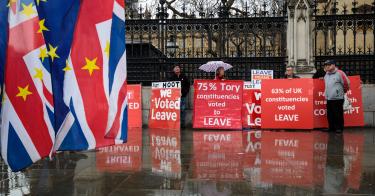Britain’s House of Commons has voted to request a delay in Britain’s exit from the European Union. It’s like a kid who removes a band-aid slowly hoping it’ll hurt less. Far better to rip it off and be done with it.
The people of the United Kingdom voted in June 2016 to leave the EU. Both major parties pledged to support that in June 2017. But currently the Commons can’t muster a majority either to support the lousy exit deal the British government has negotiated with the EU or to just bail out of the EU without a deal.
So Britain, says the Commons, cannot stay, and yet it cannot go.
It’s a ridiculous position. As British MEP Daniel Hannan puts it, if the Founding Fathers had followed Britain’s approach, they would have asked King George III to negotiate their exit from the British Empire, and when he said no, they would have put 1776 on hold until he agreed.
Cutting the ties that bind the UK to the EU was never going to be easy. But it would have been much easier if Theresa May’s government had taken the EU’s occasional hint that the two sides should negotiate a free trade area.
Admittedly, hints are not an offer, much less a deal. And a UK-EU free trade area would not have given Brussels the regulatory hold over Britain it cherishes. So the EU might well have turned its back on its hints when Britain got down to brass tacks.
But the advantages of a free trade area are so compelling that Britain was foolish not to jump at the EU’s suggestion. Instead, London has trapped itself in a dead end of pursuing a partial customs union with the EU, an approach that has all the EU’s many disadvantages and very few of its limited benefits.
May’s approach to Brexit reflects most of the fixations that have blighted Britain’s efforts to come to terms with the EU over the decades.
There is Britain’s refusal to recognize that the EU is basically a political institution, not an economic one, and so it can be expected to treat a customs union as a way to impose political controls on Britain. There is London’s obsession with European markets at the expense of the wider and faster-growing world.
And there is the malign influence of big business on British policy-making. British big businesses like the world as it is — including the EU — because this is the world in which they got big.
The May exit deal is not about solving the problem of the Irish border. A UK/EU free trade area would solve that in a minute. The May exit deal is about trying to salvage as much of the EU’s world as possible for big business. And that means a customs union with the EU.
If Britain leaves the EU without a deal, it has already announced it will cut most of its tariffs to zero. This would be a major, unilateral boost for free trade.
And British big business, embodied in the Confederation of British Industries (CBI), hates that. On Wednesday, they claimed that a turn to free trade would be a “sledgehammer for the economy.” It’s the CBI’s safety-first interests that have shaped Britain’s negotiations with the EU.
The British government is dominated by politicians who do not want the U.K. to leave the EU. But it has also been dominated by an approach that favors a few big businesses over the many smaller ones. It favors the few producers who export to the EU over the many consumers who import from everywhere.
All of these priorities are completely wrong. And together, they have backed the U.K. into a corner. The Commons has voted to kick the can down the road, but that will not solve the fundamental problem: the only deal the EU is now willing to offer is unacceptable to the U.K.
Leaving the EU was always going to hurt a bit. But British business will adapt — that is what business does. Begging the EU to offer a better exit deal is a losing game, because the EU now has no incentive to do so. Yet the right goal remains a free trade area between the U.K. and the EU.
To get there, the U.K. will have to prove that it is willing to stand on its own. And that means Britain must rip off the band-aid, exit the EU without a deal — and then approach the EU not as a supplicant, but as an independent nation with both the desire and the power to negotiate a free trade area.
The problem is not stating that as a goal. It is finding British politicians with the courage to pursue it and the vision to seek a better outcome to Brexit than the dull preservation of the status quo.
This piece originally appeared in The Washington Times



